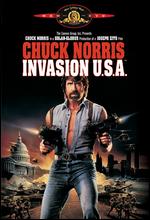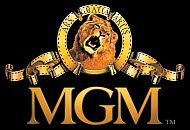Invasion U.S.A.
 for unspecified reasons.
for unspecified reasons.
Reviewed by: Brett Willis
STAFF WRITER
| Moral Rating: | Very Offensive |
| Moviemaking Quality: |
|
| Primary Audience: | Adult |
| Genre: | Action, War |
| Length: | 1 hr. 47 min. |
| Year of Release: | 1985 |
| USA Release: |

| Featuring |
|---|
| Chuck Norris, Richard Lynch, Melissa Prophet, Alexander Zale |
| Director |
|
Joseph Zito |
| Producer |
| Menahem Golan, Yoram Globus |
| Distributor |
This more-overblown-than-usual but otherwise typical 1980s Chuck Norris vehicle was at one time MGM’s second-biggest-selling video, right behind “Gone With the Wind”. Now it’s just another low-price rental gathering dust on shelves, and even most “action” fans regard it as stupid and offensive; yet it’s of interest because something like what it “predicted” has come to pass.
The film opens on a boatload of Cuban refugees being rescued by the U.S. Coast Guard—nope, they’re all murdered by international terrorists led by Mikhail Rostov (Richard Lynch) who’ve already killed the Coast Guard crew and taken their boat and uniforms. Why? There’s a stash of drugs hidden in the bottom of the refugees' boat. Cut to a characterization scene of retired CIA agent Matt Hunter (Norris). Cut back to Rostov meeting with fellow slimeball Mickey (Billy Drago) and trading the drugs for weapons—nope, that would be too simple. Cut back to Hunter, etc. Now the terrorists bring hundreds of their compatriots ashore in old WWII landing craft, and start a campaign of violence all across America. Hunter is disillusioned and tries to keep his distance; but after the terrorists push his button one too many times, he starts to take action. Eventually we learn that Hunter once captured Rostov and could have killed him, but the government wanted to trade him for captured American agents (explained more fully in the book version).
Unlike “Red Dawn”, the Invasion in this film is not by a traditional army but by a small group of highly-motivated terrorists who are able to disrupt the functioning of the U.S. with a few small, well-placed disturbances. Rostov’s words are chilling: America hasn’t been invaded in 200 years; the people are soft and delicate; they don’t understand the nature of their freedom or how it can be used against them. There’s a scene where terrorists disguised as police shoot up a nightspot full of Latino teens, thereby creating racial strife and setting the people against the real police. The book version refers to similar tactics such as shooting up a Synagogue while disguised as White Supremacists, as well as to blowing up Social Security offices; there wasn’t screen time or budget for all of those clips. But there’s a scene (which cost about $15 million to shoot) of a few terrorists attacking a mall during Christmas shopping. And when the National Guard is finally called out, some of the terrorists masquerade as Guardsmen.
People everywhere panic in response to the attacks because, although it’s unlikely that any particular citizen will be a victim, the chance is always there. And the media coverage plays right into Rostov’s hands. The disturbances virtually bring America to a standstill—until Hunter decides to come out of retirement.
Content Warnings
This film is saturated with violence and killing from beginning to end. Teens and children are killed, just because they’re in the wrong place at the wrong time. When some of the terrorists make a pre-emptive strike on Hunter’s home, they kill his Native American friend and even wound his pet armadillo. There’s profanity, drug use, nudity. Rostov has many ways of killing; but when he especially dislikes someone or wants to humiliate him, he’ll shoot him in the groin.
Possible Copycat Crimes
Shortly after this film was released, an unbalanced young woman dressed in military fatigues shot up a shopping mall. Even more serious is the possibility that films like this give ideas to real terrorists.
Possible Christological Imagery
The thing people most object to in this film is the one-man-army role of Hunter, who single-handedly takes out dozens of terrorists and finally comes up with a plan to stop Rostov’s entire gang. And that objection is valid. Note also the following: The film is set during Christmas. When a group of terrorists sets a bomb to blow up an evening church service where families are praying for safety, Hunter somehow cuts the wire and removes the bomb (in plain view of the terrorists), then destroys them with their own device. Later, a girl from that church is put on a bus out of the city; terrorists drive next to the moving bus and plant a magnetic bomb on it; and Hunter, who somehow knew beforehand what was going to happen, drives up behind, plucks the bomb off and (three guesses). Hunter performs several other feats which are beyond ordinary human power.
The problem this film illustrates (vulnerability to terrorist attack) is real; the solution is not.


PLEASE share your observations and insights to be posted here.
